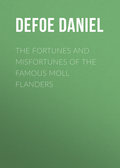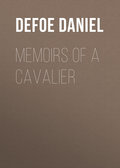
Даниэль Дефо
The History of the Life and Adventures of Mr. Duncan Campell
Second Objection against the Existence of Witches
These objectors go on to say, that provided they should allow there is an existence of spirits, yet that would be still no argument how magic should subsist, because they deny that it is impossible for a man in his body to have a commerce, much less make a contract, with spirits; but here again the refuters allege they have both experience and reason on their sides. As a joint argument of reason and experience, they tell you, that the numerous witches which have in all countries been arraigned and condemned upon this occasion, are evident testimonies of this commerce and contract being held and made with spirits. They pretend to say, that these objectors call not their, the refuters, judgment so much in question, who contend that there is a magic art, as they call in question the judgment of all the wisest legislative powers in Christendom, who have universally agreed in enacting penal laws against such capital offenders.
But here the objectors return and say, that it being impossible for us to show the manner how such a contract should be made, we can never, but without reason, believe a thing to be, of which we can form no perfect idea. The refuters, on the other hand, reply with the learned Father le Brune, it is manifest that we can see but two sorts of beings, spirits and bodies; and that since we can reason but according to our ideas, we ought to ascribe to spirits what cannot be produced by bodies. Indeed the author of the Republic of Learning, in the month of August, anno 1686, has given us a rough draught for writing a good tract of witchcraft, which he looks upon as a desideratum; where among other things, he writes thus: Since this age is the true time of systems, one should be contrived concerning the commerce that may be betwixt demons and men.
On this passage Father le Brune writes thus: "Doubtless here the author complies with the language of a great many persons, who, for want of attention and light, would have us put all religion in systems. Whatever regard I ought to have for many of those persons, I must not be afraid to say, that there is no system to be made of those truths, which we ought to learn distinctly by faith, because we must advance nothing here, but what we receive from the oracle. We must make a system to explain the effects of the loadstone, the ebbing and flowing of the sea, the motion of the planets; for that the cause of these effects is not evidently signified to us, and many may be conceived by us; and to determine us, we have need of a great number of observations, which by an exact induction may lead us to a cause that may satisfy all the phenomena. It is not the same in the truths of religion, we come not at them by groping, it were to be wished men spoke not of them, but after a decisive and infallible authority. It is thus we should speak of the power of demons, and of the commerce they have with men; it is of faith, that they have power, and that they attack men, and try to seduce them divers ways. It is true, indeed, they are sometimes permitted to have it over the just, though they have it not ordinarily, but over those that want faith, or fear not to partake of their works; and that to the last particularly, the disordered intelligences try to make exactly succeed what they wish; inspiring them to have recourse to certain practices by which those seducing spirits enter into commerce with men." Thus far Father le Brune. But still these objectors demand to know by what means this commerce may be held between demons and men, and urge us to describe the manner; or pretend that they have still reason to refuse coming into the belief of a thing which we would impose upon them, though wholly ignorant of it ourselves; to that the refuters answer thus; that both Christian divines and physicians agree as to the manner how, which they are so curious in inquiring after, that demons stir up raptures and ecstacies in men, binding or loosing the exterior senses, and that either by stopping the pores of the brain, so that the spirits cannot pass forth, as it is done naturally by sleep, or by recalling the sensitive spirits from the outward senses to the inward organs, which he there retains; so the Devil renders women witches ecstatical and magicians, who while they lie fast asleep in one place, think they have been in divers places, and done many things. This the learned objectors say proceeds from no demon, but from the disease called an epilepsy; but, on the other hand, the more learned refuters insist upon it, that these ecstacies are not epileptic seizures; this, say they, appears from Bodin, in his Theatre of Universal Nature, where he says, That those who are wrapped by the Devil, feel neither stripes nor cuttings, nor no wresting of their limbs, nor burning tortures, nor the application of a red hot iron; nay, nor is the beat of the pulse, nor the motion of the heart perceived in them; but afterwards, returning to themselves, they feel most bitter pains of the wounds received, and tell of things done at six hundred miles' distance, and affirm themselves to have seen them done. The ingenious Dr. Ader, makes an admirable physical distinction between this kind of ecstacy and a syncope, or stupor caused by narcotic medicines. Sennertus, in his Institutio Medica, writes of the demoniacal sopor of witches, who think they are carried through the air, dance, feast, and have copulation with the devil, and do other things in their sleep, and afterwards believe the same things waking. Now, he says, whether they are really so carried in the air, &c., or being in a profound sleep, or only dream they are so carried, and persist in that opinion after they are awake, these facts or dreams cannot be natural; for it cannot be that there should be so great an agreement in dreams, of persons differing in place, temperament, age, sex, and studies, that in one night, and at the same hour, they should, in concert, dream of one and the same such meeting, and should agree as to the place, number, and quality of the persons, and the like circumstances; but such dreams are suggested from a preternatural cause, viz., from the devil to his confederate, by the divine permission of an Almighty power, where punishments are to be permitted to be inflicted upon reprobate sinners.
Whence also, to those witches, sincerely converted, and refusing to be any more present at those diabolical meetings, those dreams no longer happen, which is a proof that they proceeded not before from a natural cause.
Here begins the great point of the dispute as to that branch of magic which we call natural magic. The objectors may tell us, that they will freely own that there may be an existence of spirits, that there may be an existence of witches, that by a divine power men may be influenced so far as to have a communication with good spirits, and that from thence they may become spiritual-divine magicians, they will likewise, perhaps, as freely grant, that by the intervention of a demon, things preternatural may be brought about by persons who have studied the demoniacal magic; but then what they principally insist upon is, that it must be contradictory to all human reason to imagine that there can be such a thing as natural magicians; and thus far they may form their argument. They say, that the persons, who contend for the magic art, own, that all that is brought about by magic, is by the assistance and help of a spirit, and that consequently what is effected by it must be preternatural; now, they say, it is a thing inconsistent, by a natural power, to bring about a preternatural effect; therefore, there can be no such thing as natural magic, which has within itself the efficacy of destroying those acts done by magicians in the diabolical.
To this the refuters take leave to reply, that the foundation upon which the argument is built is wrong grounded; they have admitted that, in diabolical art magic, there may be a commerce held between men and spirits, by which several preternatural effects may be brought about; and the reason they assign for it there is, because there is a preternatural agent concerned therein, the devil; but then, say they, in natural magic you can pretend to no such agent, and therefore to no such preternatural effect. This argument contains within it two fallacies; first, as to the commerce held between a man and a demon, there is nothing preternatural in getting the acquaintance; the will of the man is entirely natural, either naturally good, or naturally corrupted; the black spirit that converseth with him, it is acknowledged is not so, but it is from the will of the man, not from the power vested in the devil, that the acquaintance first grows, therefore the acquaintance itself is natural, though it arises from the last corruption and depravations of nature; but being made with a preternatural existence, though the cause of the acquaintance be corruptedly natural, yet the intermediate cause or means after that acquaintance is not so, and therefore the effect of that intermediate cause may be wonderful, and seem to be out of the ordinary course of nature. Now, since it is generally allowed that there are natural spirits of the elements, as well as divine and infernal, what we have to prove is only this, that man by natural magic may have a commerce with natural spirits of their elements, as witches may have with the spirits or demons. Now, as we said before, the commerce itself depends upon the will of the person, and is therefore natural, and consequently may as well subsist between the one as the other; for the devil cannot force a man to hold a commerce with him whether he will or no. The second fallacy is calling the effect preternatural, no otherwise than as it connotates the agent that brought it about, which is a spiritual agent; for the effect is, in itself considered, natural, and brought about by second causes that are natural, by the devil's penetration, who is subtle enough to make use of them for such and such ends. Now men, by natural spirits, which are of a faculty thoroughly subtle, may as well with natural second causes compass the remedy of an evil spirit, as the devil is able to infect men with it. From these speculations a farther plain consequence may be deduced, how a man may, by the pure force of natural magic, cure a person that is infested with evils by a demon; for how is it that a demon infests anybody with his evil motions? It is true, he is a preternatural agent, but the evil effect he does is brought about by natural causes. For how does a demon stir up raptures or ecstacies in men? Why he does it, as we are told above, by binding or loosing the exterior senses, by stopping the pores of the brain, so that the spirits cannot pass forth; and this the art of physic can compass by its drugs, and sleep causes the same thing very naturally of itself; therefore, as the evil itself is natural, the remedy, that is natural, will certainly overcome it. But then, say you, why cannot those persons be cured by physicians? I answer, not because their remedies are not in themselves sufficient to cure the evils themselves, but because generally physicians do not administer their drugs as Christians, but as physicians; and when they prescribe them to the sick they generally prescribe to them only purely considered as patients, not as Christians, and therein they come to fail; because the agent, the devil, is a subtle spirit, that brings the evil, and alters its situation before the remedy, which would master it otherwise, can take any effect; which agent, the devil, is employed by the horrible and impious faith of the antiphysician, viz., the black magician; but if the physician would act the Christian at the same time, so far as to have a faith that things ordained in the course of nature for the good of man, would have its effects in spite of a devil, if taken with a good faith by the patient; that all good things ordained to be for the natural recovery of men, if they took it with thankfulness to the sender, would have due effect; why then the natural spirits of the elements would resist the farther agency of the demoniacal spirit, and then nothing but the natural evil, caused at first by the demon, remaining in the person, without the farther superintendency of the demon, might demonstratively be taken away by the mere natural remedy or medicine. And thus good and pious physicians, making use of such proper remedies as their skill teaches them, and having an honest faith, that the goods of nature intended for the use and benefit of man, if received by the patient with the same good faith, is above the power of the devil to frustrate, may not improperly be called natural magicians. These arguments of mine I shall now take leave to back by experience.
Besides, what we have urged from reason, concerning the power of natural magic, we shall only subjoin, that divines themselves hold that natural magic, and also natural divinations and prophecies, are proved by quotations from that venerable writ which is their guide; and bring proofs from the same also, that by natural magic demons are also cast forth, but not all kinds of demons, and so many works of efficacy are wrought by natural magic: they tell you, such was the Pythonissa that raised the apparition to Saul, which appeared in a body of wind and air. Thus, if a person by natural magic should cast out demons, it does not follow that this was also from divine magic; and if demons are cast out by natural magic, by one that is in the fear of God, it does not follow that he is a true magician of God; but if it exorbitates to demoniacal, then it is condemned: and when natural magic keeps within its bounds, the divines tell us it is not condemned in the venerable book, which is the Christian's sure guide. But, inasmuch as the lawfulness even of natural magic has been called in question by others, I shall, in an Appendix joined to this treatise, examine that matter, both according to the reasons of our English laws, and according to the best stated rules of casuistry that I am a master of; still submitting my judgment to the superior judgment of those who are professed divines and lawyers; and if my opinions prove erroneous, I am willing to retract them; and therefore, in this place, there remains nothing farther for me to do, but only, as I have shown, on the one hand, how natural magic, and its powerful operations, are proved by reason, to show, on the other hand, how far reason in these cases is likewise backed and supported by well-evidenced practice, and notorious experience. And to do this, after having mentioned one memorable instance, which I refer the reader to in the body of the book, concerning the performances of Mr. Greatrix, to which a Lord Orrery was a witness, in Ireland; I shall, to avoid prolixity, bring the other testimonials of practice, from the success which our Duncan Campbell himself has had in this way on other occasions.
In the year 1713, lived in Fenchurch-street, one Mr. Coates, a tobacco-merchant, who had been for many years sorely tormented in his body, and had had recourse for a cure to all the most eminent physicians of the age, even up to the great Dr. Ratcliff himself; but all this mighty application for relief was still in vain; each doctor owned him a wonder and a mystery to physic, and left him as much a wonder as they found him. Neither could the professors of surgery guess at his ailment, or resolve the riddle of his distemper; and after having spent, from first to last, above a thousand pounds in search of proper remedies, they found the search ineffectual; the learned all agreed that it could proceed from nothing else than witchcraft; they had now indeed guessed the source of his illness, but it was an illness of such a kind that, when they had found it out, they thought themselves not the proper persons to prescribe to him any remedies. That task was reserved, it seems, for our Duncan Campbell, who, upon somebody's information or other, was sent for to the bewitched patient Mr. Coates, who found him the wonder that the others had left him, but did wonders in undertaking and compassing his cure. I remember, one of the ingredients made use of was boiling his own water, but I cannot tell how it was used; and, upon turning over the books of some great physicians since, I have found, that they themselves have formerly delivered that as one part of the prescriptions for the cure of patients in like cases. But as there are other things which Mr. Campbell performs, that seem to require a mixture of the second-sight, and of this natural magic, before they can be brought about, I will entertain the reader with one or two passages of that sort likewise, and so conclude the history of this so singular a man's life and adventures.
In the year 1710, a gentlewoman lost about six pounds' worth of Flanders lace, and inasmuch as it was a present made to her husband, she was concerned as much as if it had been of twenty times the value; and a lady of her acquaintance coming to visit her, to whom she unfolded, among other things in discourse, this little disaster, the lady, smiling, replied with this question, Did you never hear, madam, of Mr. Duncan Campbell? It is but making your application to him, things that are lost are immediately found; the power of his knowledge exceeds even the power of laws; they but restrain, and frighten, and punish robbers, but he makes thieves expiate their guilt by the more virtuous way of turning restorers of the goods they have stolen. Madam, rejoined the losing gentlewoman, you smile when you tell me this; but really, as much a trifle as it is, since it was a present to my husband, I cannot help being sensibly concerned at it, a moment's disappointment to him in the least thing in nature, creates in me a greater uneasiness than the greatest disappointment to my single self could do in things of moment and importance. What makes me smile, said the lady, when I speak of it, or think of it, is the oddness and peculiarity of this man's talent in helping one to such things; but, without the least jest, I assure you, that I know, by experience, these things come within the compass of his knowledge; and I must seriously tell you, for your farther satisfaction, that he has helped me, and several of my friends, to the finding again things lost, which were of great value. And is this, without laughing, true? said the losing fair, very gravely and demurely, like a person half believing, and desirous to be fully confirmed in such a belief. The lady she advised with did then ascertain her of the truth of the matter, alleging that, for a single half-guinea, he would inform her of her things, and describe the person that conveyed them away. No sooner was this gentlewoman convinced, but she was eager for the trial; solicited her friend to conduct her to Mr. Campbell, and, upon the first word of consent, she was hooded and scarfed immediately, and they coached it away in a trice to Mr. Campbell's house, whom they luckily found within.
The ladies had not been long seated before he wrote down the name of this new client of his, exactly as it was, viz., Mrs. Saxon. Then she was in good hopes, and with much confidence propounded to him the question about the lace. He paused but a very little while upon the matter, before he described the person that took it, and satisfied her that in two or three days she would be mistress of her lace again, and find it in some book, or corner of her room. She presented him a half-guinea, and was very contentedly going away, but Mr. Campbell very kindly stopped her, and signified to her, that, if she had no more to offer to him, he had something of more importance to reveal to her. She sat full of expectation while he wrote this new matter; and the paper he delivered to her contained the following account: As for the loss of a little bit of lace, it is a mere trifle; you have lost a great many hundreds of pounds, which your aunt (naming her name) left you, but you are bubbled out of that large sum. For while you was artfully required down stairs about some pretended business or other, one Mr. H – tt – n, conveyed your aunt's Will out of the desk, and several other things of value; and writing down the names of all the persons concerned, which put Mrs. Saxon in a great consternation, he concluded this paper, with bidding her go home with a contented mind, she should find her lace in a few days; and as she found that prediction proved true, she should afterwards come and consult about the rest.
When she came home, it seems, big at first with the thoughts of what she had been told, she rifled and ransacked every corner, but no lace was to be met with; all the next day she hunted in the like manner, but frightened the whole time as if she thought the devil was the only person could bring it, but all to no purpose; the third day her curiosity abated, she gave over the hopes of it, and took the prediction as a vain delusion, and that what she gave for it was only more money thrown away after what had been lost before. That very day, as it commonly happens in such cases, when she least dreamt of it, she lighted on it by accident and surprise. She ran with it in her hand immediately to her husband, and now she had recovered it again, told him of the loss of it, and the whole story of her having been at Mr. Campbell's about it; and then, amplifying the discourse about what he had told her besides, as to more considerable affairs, she said she resolved to go and consult him a little farther about them, and begged her husband to accompany her. He would fain have laughed her out of that opinion and intent, but the end was, she persuaded him into it, and prevailed upon him to seem at least very serious about the matter, and go with her to the oracle, assuring him there was no room for doubting the same success.
Well, to Mr. Campbell's they accordingly came; and after Mr. Saxon, in deference to his wife's desire, had paid our predictor a handsome complement of gold, Mr. Duncan Campbell saluted him in as grateful a manner, with the assurance that there was in Kent a little country house, with some lands appertaining to it, that was his in right of his wife; that he had the house, as it were, before his eyes, that though he had never substantially seen it, nor been near the place where it stood, he had seen it figuratively as if in exact painting and sculpture; that particularly it had four green trees before the door, from whence he was positive, that if Mr. Saxon went with him in quest of it, he should find it out, and know it as well the moment he come near it, as if he had been an inhabitant in it all his life.
Mr. Saxon, though somewhat of an unbeliever, yet must naturally wish to find it true, you may be sure, and yet partly doubting the event, and partly pleased with the visionary promise of a fortune he never expected, laughed very heartily at the oddness of the adventure, and said he would consider whether it would not savour too much of Quixotism, to be at the expense of a journey on such frolics, and on such a chimerical foundation of airy hopes, and that then he would call again and let Mr. Campbell know his mind upon that point.
In every company he came into, it served for laughter and diversion; they all, however, agreed it was worth his while, since the journey would not be very expensive, to go it by way of frolic. His wife, one morning, saying that she did remember some talk of a house, and such things as Mr. Campbell had described, put him forward upon the adventure; and upon Mr. Saxon's proposing it to his brother Barnard, Mr. Barnard favoured the proposal as a joke, and agreed upon the country ramble. They came on horseback to Mr. Campbell's with a third horse, on which the dumb predictor was mounted, and so on they jogged into Kent, towards Sevenoaks, being the place which he described. The first day they set out was on a Saturday morning in June, and about five that afternoon they arrived at the Black Bull, at Sevenoaks, in Kent. It being a delicate evening, they took an agreeable walk up a fine hill, gracefully adorned with woods, to an old seat of the Earl of Dorset. Meeting by the way with an old servant of the earl, one Perkin, he offered Mr. Barnard, who it seems was his old acquaintance, to give them all a sight of the fine ancient seat.
After they had pleased themselves with viewing the antique nobility of that stately structure, this Perkin went back with them to their inn, the Bull, at Sevenoaks. They that could talk, were very merry in chat; and the dumb gentleman, who saw them laugh and wear all the signs of alacrity in their countenances, was resolved not to be behind with their tongues, and by dint of pen, ink, and paper, that he made signs should be brought in, was resolved, if one might be said to crack without noise, to crack his jest as well as the best of them; for it may be truly said of him, that he seldom comes into any, even diverting company, where he is not the most diverting man there, and the head, though we cannot call him the mouth, of the cheerful society. After having eyed this Perkin a little, and being grown, by his art, as we may suppose, as familiar with the man's humour as if he had known him as many years as Mr. Barnard, Pray, Mr. Barnard, quoth he, in writing, how comes it, you, that are so stanch and so stiff a whig, should be so acquainted and so particularly familiar with such an old Papist, and so violent a Jacobite, as I know that Mr. Perkin (whom I never saw nor had any notice of in my life) to be? And pray, replied Mr. Barnard, what reason have you beyond a pun to take him for a Jacobite? Must he be so because his name is Perkin? I do assure you, in this you show yourself but little of a conjurer; if you can tell no more of houses than you do of men, we may give over the search after the house you spoke of. (Here the reader must understand they discoursed on their fingers, and wrote by turns.) Mr. Campbell replied, seriously, Laying a wager is no argument in other things, I own, but in this I know it is, because I am sure, after we have laid the wager, he will fairly confess it among friends, since it will go no farther; and I, said Mr. Campbell, will lay what wager you will apiece with you all round. Hereupon, Mr. Barnard, who had known him a great many years, was the first that laid, and many more, to the number of five or six, followed his example; the decision of the matter was deferred till next day at the return of the old man to the inn, they being about to break up that night and go to bed.
The next day being Sunday, the landlord carried his guests to see the country, and after a handsome walk, they came through the churchyard. They were poring upon the tombs; no delight can be greater to Mr. Campbell than that; and really, by the frequent walks he usually takes in Westminster abbey, and the churchyards adjacent to this metropolis, one would imagine he takes delight to stalk along by himself on that dumb silent ground, where the characters of the persons are only to be known, as his own meaning is, by writings and inscriptions on the marble. When they had sufficiently surveyed the churchyard, it grew near dinner-time, and they went homewards; but before they had got many yards out of the churchyard, Mr. Campbell makes a full stop, pointing up to a house, and stopping his friends a little, he pulls out of his pocket a pencil and paper, and notes down the following words: That, that is the house my vision presented to me; I could swear it to be the same, I know it to be the same, I am certain of it. The gentlemen with him remarked it, would not take any farther notice at that time intending to inquire into it with secrecy, and so went on to the inn to dinner.
As merry as they had been the night before after supper, they were still more innocently cheerful this day after dinner, till the time of service begun. When the duty of the day was performed and over, they returned to divert and unbend their minds with pleasant but harmless conversation. I suppose nobody but a set of very great formalists will be offended with scandal or scruples, that to travellers just ready to depart the town, Mr. Perkin came on that good day and decided the wagers, by owning to all the company, secrecy being first enjoined, that he was a Roman Catholic, though nobody of the family knew it in so many years as he had lived there, which was before Mr. Campbell was born. This and other innocent speeches afforded as much cheerfulness as the Lord's-day would allow of.
On the next day, being Monday, they sent for one Mr. Toland Toler, an attorney of the place, to find out to whom that house belonged, but by all the inquiry that could possibly be made with convenient secrecy, nobody could find it out for a long time; but at last it came to light and appeared to be justly to a tittle as Mr. Campbell had predicted.
Being now satisfied, the next day our three travellers returned for London; and the two vocal men were very jocular upon their adventure, and by their outward gesticulations gave the prophetical mute his share of diversion. Mr. Barnard, as they passed into a farmhouse-yard, remarked that all the hogs fell a grunting and squeaking more and more as Mr. Campbell came nearer, (who, poor man! could know nothing of the jest, nor the cause of it, till they alighted and told it him by signs and writing,) said to Mr. Saxon, laughing, Now we have found out our house, we shall have only Mr. Campbell home again by himself – we have no farther need of the devil that accompanied him to the country, up to town with us, there are other devils enow to be met with there he knows; and so this, according to the fashion of his predecessor devils, is entered into the herd of swine.
However, the event of this journey, to cut the story short, procured Mr. Saxon a great insight, upon inquiry, into several affairs belonging to him, of which he would otherwise have had no knowledge; and he is now engaged in a chancery suit to do himself justice, and in a fair way of recovering great sums of money, which, without the consultation he had with this dumb gentleman, he had in all likelihood never dreamt of.







